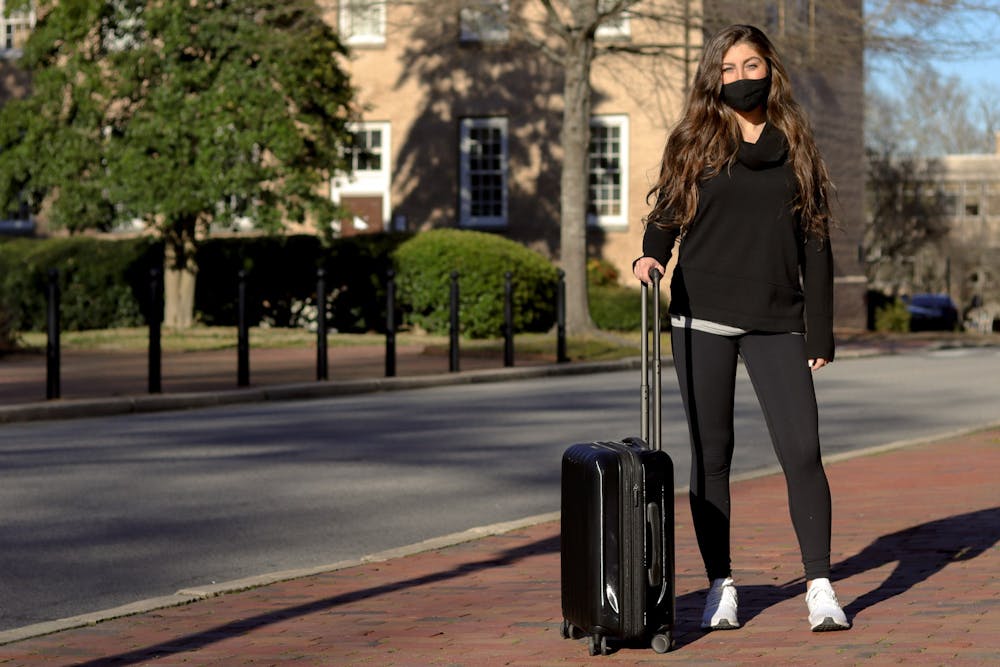She said after the number of COVID-19 cases increased, her classes went fully virtual. By mid-March, UNC contacted her about returning to the U.S.
“I don’t think I was surprised because I had friends in Europe who had to go back home way earlier,” Rai said. “I did feel like it was a matter of time until we had to come back.”
Rai said UNC gave students the option of staying abroad if they could find a way to extend their student visas. Students in countries with low numbers of COVID-19 cases, such as Singapore, Taiwan and New Zealand, had the option to stay abroad, Shepard said.
“Some students were able, in those situations, to kind of hunker down and stay,” Shepard said. “The situation was a little bit better for them.”
But Rai said uncertainty around the ability to return home motivated many students to leave.
“I think generally people felt like Singapore was a safer place to be but, naturally, every country was calling back their citizens,” Rai said. “It was that tough situation of, ‘Where are we actually going to be safer?’ I think that’s what a lot of us had to sit down and figure out.”
Rai said she returned home at the end of March, about two weeks after she received UNC’s email to return. UNC helped her pay for her flights back home.
Rai said UNC did a good job aiding in the transition back home by being in constant communication with returning students, allowing her classes to be declared pass/fail and hosting virtual wellness sessions. She was able to complete the rest of her coursework online.
The shift to virtual
Shepard said most students were able to return to their home countries by the end of March. But some students were unable to return due to border closings.
“We kept close in touch with those students,” Shepard said. “All were able to complete their academic programs, too.”
Shepard said the study abroad office helped international students who were unable to come to campus this year by putting them in study abroad programs in their home countries. This helped students avoid large time zone differences for synchronous classes.
To get the day's news and headlines in your inbox each morning, sign up for our email newsletters.
Marlee Greene, a junior majoring in advertising and public relations, studied at Lorenzo de’ Medici in Florence, Italy in spring 2020. She said her program was supposed to last from January to the beginning of May, but she was only there a little more than two months.
“It got really serious, really fast,” Greene said.
Greene said she knew UNC would cancel the program when she saw students from other U.S. universities returning home.
“I knew of probably two or three people within my program — one of them being one of my roommates,” Greene said. “She had decided to go ahead and go back just because her parents wanted her back, which I completely understand. It was just all so up in the air.”
Greene said she and her parents worked with UNC study abroad advisers and her university in Italy to plan her return to the U.S. She had to work with the airlines and pay a little extra to reschedule her original flights, but she returned to the U.S. on March 3 to begin quarantining.
She said she went about three weeks without school while her classes transitioned to online formats.
“I think UNC did the best they could because I know that they wanted us to stay there just as much as we wanted to,” Greene said.
Shepard said the decision to return students home was made in conjunction with the Vice Provost for Global Affairs and the Risk Management Advisory Committee. He said these decisions were based on data from the U.S. State Department, the Centers for Disease Control and Prevention and the World Health Organization threat analysis.
Shepard said although the number of programs is reduced, there are still opportunities for students to study abroad both in-person and virtually.
“There’s really a whole host of opportunities,” Shepard said. “We’re always happy to help students explore a global experience.”
This story is the first of two-part series about the experience of study abroad during COVID-19.
university@dailytarheel.com



